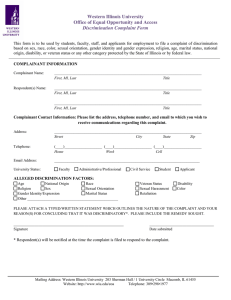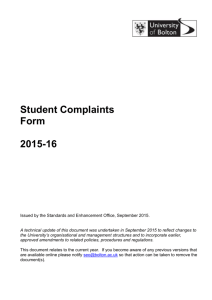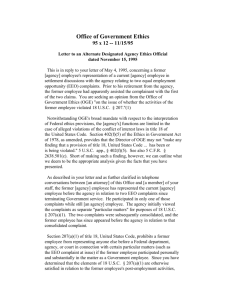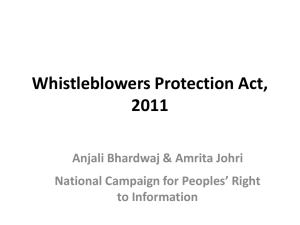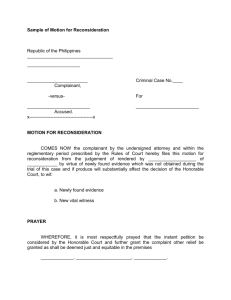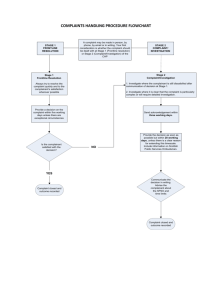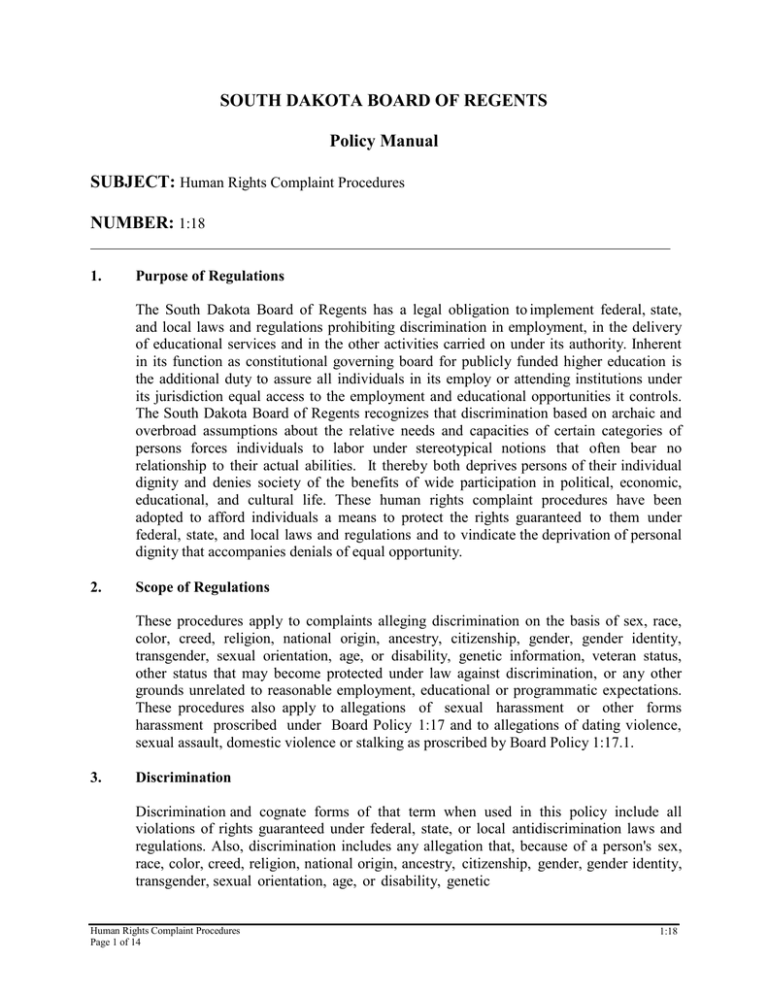
SOUTH DAKOTA BOARD OF REGENTS
Policy Manual
SUBJECT: Human Rights Complaint Procedures
NUMBER: 1:18
1.
Purpose of Regulations
The South Dakota Board of Regents has a legal obligation to implement federal, state,
and local laws and regulations prohibiting discrimination in employment, in the delivery
of educational services and in the other activities carried on under its authority. Inherent
in its function as constitutional governing board for publicly funded higher education is
the additional duty to assure all individuals in its employ or attending institutions under
its jurisdiction equal access to the employment and educational opportunities it controls.
The South Dakota Board of Regents recognizes that discrimination based on archaic and
overbroad assumptions about the relative needs and capacities of certain categories of
persons forces individuals to labor under stereotypical notions that often bear no
relationship to their actual abilities. It thereby both deprives persons of their individual
dignity and denies society of the benefits of wide participation in political, economic,
educational, and cultural life. These human rights complaint procedures have been
adopted to afford individuals a means to protect the rights guaranteed to them under
federal, state, and local laws and regulations and to vindicate the deprivation of personal
dignity that accompanies denials of equal opportunity.
2.
Scope of Regulations
These procedures apply to complaints alleging discrimination on the basis of sex, race,
color, creed, religion, national origin, ancestry, citizenship, gender, gender identity,
transgender, sexual orientation, age, or disability, genetic information, veteran status,
other status that may become protected under law against discrimination, or any other
grounds unrelated to reasonable employment, educational or programmatic expectations.
These procedures also apply to allegations of sexual harassment or other forms
harassment proscribed under Board Policy 1:17 and to allegations of dating violence,
sexual assault, domestic violence or stalking as proscribed by Board Policy 1:17.1.
3.
Discrimination
Discrimination and cognate forms of that term when used in this policy include all
violations of rights guaranteed under federal, state, or local antidiscrimination laws and
regulations. Also, discrimination includes any allegation that, because of a person's sex,
race, color, creed, religion, national origin, ancestry, citizenship, gender, gender identity,
transgender, sexual orientation, age, or disability, genetic
Human Rights Complaint Procedures
Page 1 of 14
1:18
information, veteran status or any other status that may become protected under law
against discrimination or other grounds unrelated to reasonable employment, educational
or programmatic expectations, a person has been subjected to disparate treatment in
terms and conditions of employment, in the delivery of educational services, programs or
activities, or with respect to the participation in the activities of officially recognized
organizations. Allegations, reports or complaints involving harassment, or sexual
assault or other animus-based assault, brought under Board Policy No. 1:17(2)(B) and
allegations of sexual assault, domestic violence or stalking as proscribed by Board
Policy No. 1:17.1 will also constitute discrimination complaints within the meaning of
these regulations, notwithstanding the fact that they may not otherwise be encompassed
hereunder.
4.
Proof of Discrimination
Except as otherwise provided under federal, state, and local law, proof of discrimination
under these regulations will conform to the federal standards employed to prove disparate
treatment. These regulations will neither eliminate nor restrict express exceptions to
antidiscrimination laws and regulations provided under federal, state or local law,
nor will they prohibit conduct, action or policies based upon such legitimate
nondiscriminatory reasons as are recognized under federal antidiscrimination law.
A.
5.
Reasonable directions and admonitions by duly authorized institutional agents as
to time, place and manner in which employees or volunteers perform assigned
responsibilities, students carry out educational assignments or program
participants engage in sponsored activities do not constitute prima facie evidence
of discrimination.
Complaints
Complaints include all allegations or reports of discrimination by a person, persons, or
organization subject to this policy against a person protected under this policy.
A.
All organizations recognized by an institution are subject to this policy, except
insofar as the application of the policy would impermissibly invade the members'
freedom of intimate association or freedom of expressive association.
1.
Challenges to the applicability of these regulations will be referred to an
administrative officer designated by the institutional chief executive officer
as provided in section 13(A) below. Questions about the
applicability of this chapter to organizations will be resolved pursuant to
the provisions of section 13 and following.
2.
If an organization challenges the application of these policies to it or to its
activities, resolution of the challenge must address the following issues:
Human Rights Complaint Procedures
Page 2 of 14
1:18
a.
Will application of the regulations serve a compelling state
interest?
i.
b.
Application of the regulations is unrelated to the suppression of
ideas.
i.
c.
The Board has determined that it has a compelling interest
in applying these regulations to individuals and
organizations whose activities affect the ability of others to
participate in and to enjoy the benefits of institutional
employment, educational services or the activities of
officially recognized organizations, so this issue may
ordinarily be resolved through reference to sections 1 and 2
above.
This issue requires a factual inquiry into the purpose of
applying the regulations to particular organizations. An
institution may not apply the regulations in order to
suppress a particular point of view. The mere dissemination
of ideas, however offensive to good taste and common
decency such ideas may be, does not afford grounds for
regulation.
Can the state's compelling interest be achieved through means
significantly less restrictive of associational freedoms?
i.
This issue requires a two-step analysis. First, it must be
determined whether application of the regulations would
infringe associational rights of organization members. If so,
a determination must be made whether some less intrusive
measures might suffice to protect the Board's compelling
interests.
(a)
The following principles will be used to
determine whether application of the Board's
policies to an organization might invade the
association rights of organization members:
(1)
Human Rights Complaint Procedures
Page 3 of 14
Freedom of intimate association refers to those
relationships that presuppose deep attachments
and commitments to the necessarily few other
individuals with whom one shares not only a
special community of thoughts, experiences
and beliefs, but also distinctively personal
aspects of one's life.
1:18
Factors that suggest that freedom of intimate
association is implicated include:
(a)
(b)
(c)
(d)
(2)
6.
the relative smallness of the
organization;
a high degree of selectivity in
choosing and maintaining members
of the organization;
the personal nature of
the
organization's purpose; and
the exclusion of nonmembers from
the central activities of the
organization.
Freedom of expressive association is
implicated where an organization is created
for specific expressive purposes and the
organization
will
be
significantly
inhibited in advocating its desired
viewpoints if it cannot restrict its
membership based on sex race, color, creed,
religion,
national
origin,
ancestry,
citizenship,
gender,
gender
identity,
transgender,
sexual
orientation,
age,
disability, genetic information or veteran
status any other status that may become
protected under law against discrimination.
Complainants
Complainants includes persons who have allegedly been subjected to discrimination,
whether they have initiated a complaint with the Title IX/EEO Coordinator or whether
they were identified as victims in a report submitted by a third party to the Title IX/EEO
Coordinator.
7.
Title IX/EEO Coordinator
Each institution will designate a Title IX/EEO Coordinator who will be responsible for
administering a centralized complaint filing system; for analyzing trends revealed by
complaints, investigations and enforcement activities; and for monitoring on behalf of the
institution overall compliance with this policy and related federal, state or local legislation
and regulation.
A.
The institution may designate one or more deputy Coordinators to assist the Title
IX/EEO Coordinators. Such deputies will be authorized to receive complaints
and will have full power to conduct reviews and investigations as directed by the
institutional Title IX/EEO Coordinator.
Human Rights Complaint Procedures
Page 4 of 14
1:18
B.
Whenever the phrase “Title IX/EEO Coordinator” appears in this policy and other
policies in connection with administering an individual complaint, it will be
understood to include both the Coordinator and any deputy Coordinators who
may have been assigned responsibilities to administer the matter.
C.
The Title IX/EEO Coordinator will assure that persons entrusted with the
investigation of complaints have been undergone annual training in the conduct of
investigations, including investigations into allegations relating to dating violence,
domestic violence, sexual assault and stalking, as defined in Board Policy No.
1:17.1, in a manner that protects the safety of victims and promotes accountability.
The Title IX/EEO Coordinator will also assure that persons entrusted with
investigations are unbiased and disinterested.
1.
In the event that a complainant or accused alleges that an investigator is
biased or has a conflict of interest, the Title IX/EEO Coordinator will
review the evidence of bias or interest, and will reassign responsibility for
the investigation when reasonable, well-informed observer of the
administrative process would believe that there may be an appearance of
bias or conflict, even though none actually exists.
a.
D.
When determining whether there are reasonable, objective grounds
for concluding that an appearance of bias or conflict of interest
exists, the Title IX/EEO Coordinator will consider, without
limitation, evidence of
i.
personal bias or prejudice against the complainant or
accused or personal knowledge of the disputed facts
ii.
prior involvement in the incident or institutional response to
the reports,
iii.
economic interests, including interests immediate family
members, that may be substantially affected by the outcome
of the investigation, or
iv.
close relationships, either directly or indirectly through
immediate family members, with a complainant, an accused
or witnesses involved in the proceeding.
The Title IX/EEO Coordinator will assure that persons entrusted with the conduct of
disciplinary proceedings have been undergone annual training in the conduct of
disciplinary proceedings, including proceedings involving allegations relating to
dating violence, domestic violence, sexual assault and stalking, as defined in Board
Policy No. 1:17.1, in a manner that protects the safety of victims and promotes
accountability.
Human Rights Complaint Procedures
Page 5 of 14
1:18
1.
In the event that a complainant or accused alleges that a person entrusted with
the conduct of disciplinary proceedings is biased or has a conflict of interest,
the Title IX/EEO Coordinator will review the evidence of bias or interest, and
will submit a recommendation to the institutional chief executive officer
whether responsibility for the disciplinary proceeding should be reassigned.
2.
In order to discourage abuse of the reassignment process, reassignment will
not be routine, but may be proper where reasonable, well-informed observer of
the administrative process would believe that there may be an appearance of
bias or conflict, even though none actually exists
a.
i.
ii.
iii.
iv.
8.
When determining whether there are reasonable, objective grounds for
concluding that an appearance of bias or conflict of interest exists, the
Title IX/EEO Coordinator will consider, without limitation, evidence of
personal bias or prejudice against the complainant or accused or
personal knowledge of the disputed facts
prior involvement in the incident or institutional response to the
reports,
economic interests, including interests immediate family members, that
may be substantially affected by the outcome of the investigation, or
close relationships, either directly or indirectly through immediate
family members, with a complainant, an accused or witnesses involved
in the proceeding.
Non-retaliation
Persons who bring complaints of discrimination and persons who participate in the
investigation and disposition of such complaints will not be subject to harassment,
interference, intimidation, or retaliation.
A.
9.
The right to be free from harassment, interference, intimidation or retaliation is
ongoing, and the Title IX/EEO Coordinator will inform the complainant, the
accused and all persons involved in the investigation or disposition of complaints of
the right and provide them with information detailing how they may report
violations.
Duty to Cooperate
All students and employees whose assistance is needed in the investigation of a
complaint or in the course of disciplinary action will be required to cooperate with the
Title IX/EEO Coordinator, any designated Title IX Deputy, and other parties who are
duly authorized to investigate or to discipline. Persons who are accused of having
e n g a g e d in discriminatory conduct will be entitled to such cooperation when
necessary to obtain witnesses in any formal disciplinary proceedings that may be
Human Rights Complaint Procedures
Page 6 of 14
1:18
initiated. Where necessary, adjustments will be made to work schedules, classroom
schedules, and other academic or employment obligations.
10.
Confidentiality
Reasonable efforts will be made to maintain the confidentiality of the complaints.
Complainants and witnesses must understand that it may become necessary to disclose
their identities, either directly or indirectly, in the course of investigation. Institutions are
required to respond to and investigate allegations of discrimination.
A.
Even if the complainant requests confidentiality or asks the complaint not be
pursued, institutions will; 1) take all reasonable steps to investigate and respond
to the complaint to the extent possible consistent with the alleged victim’s
wishes; 2) notify the alleged victim that the failure of the alleged victim to pursue
a complaint may limit the institutions’ ability to fully address the matter; and 3)
report the incident to local law enforcement authorities if it appears to involve a
crime that is required to be reported or a health or safety emergency as defined by
state or federal law requires such reporting.
B.
Where formal disciplinary proceedings are instituted, the party alleged to have
engaged in the conduct will be given the names of the complaining party and the
witnesses whose testimony will be used to support the complaint, together with the
substance of their allegations.
1.
Where the complaint involved conduct proscribed under Board Policy No.
1:17.1, both complainant and accused will be provided access to any
information that will be used during informal and formal disciplinary
meetings and hearings.
C.
Disciplinary hearings at the institutional level ordinarily are not open to the public,
but, in some instances, persons accused of misconduct may have appeal rights
that could result in a public hearing. The Title IX/EEO Coordinator will inform
complainants whether the accused has a right to a public hearing under South
Dakota law and at what point that hearing may occur. In the event of a public
hearing, the pleadings, motions, documents and recorded testimony assembled at or
incidental to the hearing will be public records.
D.
Where the complaint involved conduct proscribed under Board Policy No. 1:17.1,
and, upon request, both a complainant or an accused complainants and accuseds may
bring advisors of their choosing to any institutional disciplinary proceeding or any
related meeting or proceeding that they are required or permitted to attend. Both
complainants and accuseds will be given written notice of meetings at which one or
the other or both may be present and accompanied by their chosen advisors. The
notice will be given with reasonable time to allow complainants and accuseds
opportunity to make arrangements for the advisor to attend, but the institution need
not cancel or delay a meeting simply because an advisor could not be present, so long
Human Rights Complaint Procedures
Page 7 of 14
1:18
as the institution gave timely, written notice of the meeting. Electronic notification
may be used if permitted under the relevant disciplinary procedures.
E.
Where complaint results in a formal disciplinary action, the complainant will be
informed in writing whether the institutional procedures resulted in a finding of
discrimination.
1.
Where the complaint involved conduct proscribed under Board Policy
No. 1:17(2)(B), the complainant will be informed of the finding and
sanction.
2.
Where the complaint involved conduct proscribed under Board Policy No.
1:17.1, both complainant and accused will be informed of any initial,
interim, and final decision involving sanctions, the rationale for the decision
and, where sanctions are imposed, the sanction imposed.
a.
11.
Personally identifying information about third party student
witnesses will be redacted to the extent feasible.
Reports to Law Enforcement
In keeping with the requirements of SDCL § 22-11-12, once the Title IX/EEO
Coordinator acquires knowledge, that is not privileged, of the commission of a felony, the
Coordinator will immediately disclose the felony, including the name of the perpetrator,
if known, and all of the other relevant known facts to appropriate law enforcement
authorities.
A. The Title IX/EEO Coordinator, in consultation with appropriate institutional officials,
will analyze each report of sexual assault, domestic violence or stalking to determine
if the circumstances require a report under SDCL § -22-11-12 or present health or
safety emergency. In such case, information relating to the complaint may be
disclosed to appropriate persons including law enforcement personnel.
B. Reports of crimes may be filed with law enforcement with or without the assistance
of the institutions. The Title IX/EEO Coordinator will report complaints of sexual
violence to law enforcement agencies when requested to do so by an alleged victim.
C. A campus Title IX/EEO Coordinator may disclose the fact and nature of sexual
assault, domestic violence or stalking to local law enforcement officials in accordance
with local law enforcement agreements.
D. Timely warnings or emergency notifications issued under the Clery Act related to
sexual assault will also be sent to local law enforcement agencies.
Human Rights Complaint Procedures
Page 8 of 14
1:18
12.
Timing Requirements
Timing requirements contained in this policy fix standards for the investigation and
preliminary phases of complaint management. Where an investigation results in the
initiation of formal disciplinary procedures, the timelines set forth in those procedures
will govern.
Deadlines stipulated for action may be relaxed where, in the judgment of the Title
IX/EEO Coordinator or other administrative officer having responsibility for the
complaint, this will help to achieve the purposes of the regulations. Investigation and
responses related to allegations of sexual abuse, domestic violence, stalking or
conduct constituting a crime of violence may be delayed to the extent required for law
enforcement to investigate the facts of the case.
Deadlines may also be extended upon the mutual agreement of the parties.
Deadlines will be extended if necessary to accommodate holidays and vacation periods
that form part of the academic calendar or days on which an institution is closed for
weather or other emergency purposes. Working days are those on which the offices of
the institution or Board are open for business.
Extensions will not exceed the bounds allowed by applicable law and regulations.
13.
Initiation of Complaint
A.
All inquiries, allegations, reports, or complaints relating to discriminatory conduct,
including conduct proscribed by Board Policies 1:17 and 1:17.1 will be forwarded to
the Title IX/EEO Coordinator for response or investigation.
1. Persons who believe that they have been subjected to discrimination may
bring complaints under these procedures by contacting the Title IX/EEO
Coordinator. Collective bargaining agents may also initiate complaints
hereunder, but only where they would have standing to do so under state
or federal law. Collective bargaining agents will not be entitled to exercise
procedural rights granted to complainants.
2. A person who believes that he or she has been the victim of
discrimination may also lodge a complaint with any administrator or, in the
case of students, also with any faculty member. Complaints lodged with such
individuals will be referred to the Title IX/EEO Coordinator for investigation.
This provision will not be interpreted to require individuals to refer to the
Title IX/EEO Coordinator accusations addressed to them directly by aggrieved
persons.
3. Third party reports of discrimination and conduct observed directly that may
be discriminatory should be investigated as provided herein.
Human Rights Complaint Procedures
Page 9 of 14
1:18
4. Any campus employee informed of an allegation of sexual abuse, domestic
violence or stalking with a clear connection to institutional programs,
personnel or students must promptly notify the Title IX/EEO Coordinator.
Employees serving in certain professional roles which enjoy a statutory
privilege are required to disclose information only in accordance with
applicable statutory authority.
B.
Upon receipt of inquiries, allegations, reports, or complaints relating to
discriminatory conduct or sexual violence, the Title IX/EEO Coordinator will
respond or investigate.
1. The Title IX/EEO Coordinator will have the responsibility to advise the
individual or group of the procedures for investigating and taking action upon
the complaint.
a. The Title IX/EEO Coordinator will advise the complainant of any
counseling or support groups that are available for persons who feel that
they have been subjected to discriminatory conduct and their options to
avoid contact with the alleged perpetrator pending the results of the
investigation and any related proceedings.
b. The complainant will also be informed of the right to file other
applicable administrative or criminal complaints and will not be dissuaded
from doing so.
c. C o m p l a i n a n t s will be informed that the Title IX/EEO Coordinator will
investigate allegations and take appropriate action, even if the complainant
does not wish to pursue the disciplinary process, but that any response by
the University may be hindered by the complainant's wishes for anonymity
or inaction or both.
2. Having provided this information to the complainant, the Title IX/EEO
Coordinator will record the factual basis for the complaint.
C.
If the complaint is referred to the Title IX/EEO Coordinator by another
administrator or faculty member, the Title IX/EEO Coordinator will contact
the complainant within five working days to provide information about
procedures and resources and to record an initial statement of the factual basis
for complaint.
D.
Upon obtaining a statement of the factual basis of the complaint, the Title IX/EEO
Coordinator will initiate an investigation of the complaint to determine whether
there is a reasonable basis to believe that the complainant was subjected to
discrimination or sexual violence. The investigation will be completed within
twenty working days.
Human Rights Complaint Procedures
Page 10 of 14
1:18
E.
14.
If the complaint involves an alleged violation of Board Policies 1:17 or 1:17.1,
the Title IX/EEO Coordinator will determine what interim measures may be
available to protect the interests of the complainant and the accused during the
investigation.
1.
In concert with the senior institutional officer whose administrative
responsibilities include supervision of the person accused of misconduct,
the Title IX/EEO Coordinator will take action to assure that (a) the
complainant is protected from retaliation for having made a complaint or
responded to inquiries initiated in response to a complaint, (b) necessary
or appropriate interim measures are taken to guard against a recurrence of
the conduct that gave rise to the complaint, (c) requests for the
complainant's academic, living, transportation, and working situation are
reviewed case by case through an interactive process and granted if they
are reasonably available and (d) the complainant is informed of the options
to request protection or accommodation and how to request such
assistance.
2.
When selecting interim measures, the Title IX/EEO Coordinator and
senior institutional officer will consider nature and circumstances of the
misconduct alleged, together with the strength of prima facie evidence and
any indications relative to the risk of recurrence, and will prefer measures
that minimize the relative inconvenience to the complainant.
3.
The Title IX/EEO Coordinator will meet with the complainant or victim
within three working days after receipt of the complaint or after meeting
with the victim to discuss the proposed interim measures that. No later
than two working days thereafter, the interim measures will be put into
place.
Procedure Where Title IX/EEO Coordinator Determines That There is Not a
Reasonable Basis to Proceed
A.
If the Title IX/EEO Coordinator determines that there is not a reasonable basis for
believing that complainant has been subjected to discrimination or sexual
violence, the Title IX/EEO Coordinator will inform the complainant of the
conclusion and will proceed as set forth in Board Policy No. 1:17(3)(B)(3).
B.
If the complainant believes that the Title IX/EEO Coordinator erred in
concluding that the complaint did not have a reasonable basis, the complainant
may petition the institutional chief executive officer for a review of that
determination. The petition must be received within fifteen working days after the
complainant has been notified that the Title IX/EEO Coordinator has determined
that there is no reasonable basis to believe that the complainant was subjected to
discrimination. The institutional chief executive officer, either personally or
through a delegatee, will review the investigation file to determine whether the
Human Rights Complaint Procedures
Page 11 of 14
1:18
conclusions of the Title IX/EEO Coordinator are based upon substantial evidence.
The chief executive officer will respond in writing to the complainant and the
accused at the conclusion of this review. If the chief executive officer concludes
that the evidence supports the conclusions of the Title IX/EEO Coordinator, the
response will summarize the findings that lead to that conclusion to the extent that
this may be done without compromising the privacy of third parties, persons
accused of misconduct or the complainant.
C.
15.
The decision of the chief executive officer is not subject to an appeal as a matter
of right. If the complainant remains dissatisfied with the determination, the
complainant may request that the Executive Director review the conclusions
reached by the chief executive officer and to advise the Board pursuant Board
Policy No. 1:6(4). The request for such a review should identify with specificity
the factual findings that the complainant believes to be erroneous or the
conclusions that the complainant believes mistake or misapply the requirements
of Board Policy or governing law.
Procedures
Where
Title IX/EEO Coordinator Determines That There is a
Reasonable Basis to Proceed
A.
If the Title IX/EEO Coordinator concludes that there is a reasonable basis for
the complaint, the Title IX/EEO Coordinator will notify the vice president or
comparable chief administrative officer or their appropriate designee, having
supervisory responsibility over the person or persons alleged to have engaged in
discriminatory conduct or sexual violence. The Title IX/EEO Coordinator will
provide copies of all investigatory materials to that administrative officer.
Thereupon, that administrative officer will participate in resolution of the matter.
If the complaint is lodged against officially recognized organizations or against
members of such entities who are not otherwise affiliated with the institution, the
institutional chief executive officer will designate a person to carry out the
responsibilities established hereunder.
B.
The Title IX/EEO Coordinator and the administrative officer may attempt an
informal resolution of the dispute.
1.
If the matter appears to them to lend itself to informal resolution, they will
meet with the complainant to determine whether the complainant is willing
to pursue an informal resolution and how the necessary discussion with the
person accused of misconduct may be structured.
2.
In cases involving allegations of conduct violating Board Policy No.
1:17.1 mediation will not be used as an informal dispute mechanism and
in such cases, the complainant will be notified of their right to stop the
informal process and initiate the formal resolution process at any time.
3.
If an informal resolution is effected, the terms of the resolution will be
Human Rights Complaint Procedures
Page 12 of 14
1:18
reduced to writing and signed by the complainant. The University will
document the administration of any agreed upon discipline or remedial
action through such means as are appropriate and customary under the
relevant disciplinary procedures or are in keeping with other relevant
administrative practices. Copies of the signed document will be preserved
in the complaint file and as otherwise necessary to give effect to the terms
of the resolution.
16.
C.
If the Title IX/EEO Coordinator and administrative officer elect not to attempt
an informal resolution, an informal resolution is not effected, or the complainant
in a matter arising under Board Policy No. 1:17.1 elects to pursue a formal
resolution process, the administrative officer will initiate disciplinary proceedings
against the person alleged to have engaged in discriminatory conduct.
D.
The administrative officer will institute formal disciplinary proceedings within
fifteen working days from the time that the file has been submitted to the officer,
unless an informal resolution has been effected or the complainant and the person
alleged to have engaged in discriminatory conduct or sexual violence have agreed
in writing to extend the time allowed to attempt an informal resolution.
E.
The disciplinary procedures followed will be those designated for persons in the
classification to which the person or persons alleged to have engaged in
discriminatory conduct belong. Faculty members will be subject to discipline
consistent with the COHE contract or the Regents Policy Manual depending upon
their unit or non-unit status. CSA employees will be subject to discipline under
CSA regulations. Exempt staff will be subject to discipline under exempt
regulations. Students will be subject to discipline under the institutional student
disciplinary code. If no disciplinary procedures otherwise exist, the institutional
chief executive officer will appoint a hearing examiner to conduct a hearing to
determine the facts and to recommend to the institutional chief executive officer
what disposition should be made of the matter.
Procedures for Disciplining Persons Found to Have Committed Acts of
Discrimination
A.
17.
Discipline of persons found to have committed acts of discrimination will be
determined and carried out in accordance with the relevant disciplinary
procedures.
Disciplinary Action
A.
If the discriminatory conduct is admitted or, as a result of the disciplinary
proceedings, proven, the administrative officer who initiated the disciplinary
procedures will determine what disciplinary action, if any, will be taken to remedy
the effects of the discriminatory conduct. In selecting a discipline or action, the
Human Rights Complaint Procedures
Page 13 of 14
1:18
administrative officer will consider (1) the extent to which the party charged
exercised undue influence over the complainant by virtue of the office and authority
entrusted to the party charged or otherwise, (2) the gravity of the offense
established, and (3) the likelihood that the discipline or action selected will be
effective to avoid a recurrence of the conduct. The discipline may include
suspension or termination of an individual’s employment, enrollment or right to
enter institutional grounds or facilities or to attend or participate in institutional
activities.
B.
Once the administrative office has selected a proposed discipline or action, the
party charged will be notified of the proposed discipline or action at such time and
in such a manner as provided under the applicable grievance procedures. The
complainant will be notified of the proposed discipline at the same time. The
discipline or action will not become finalized if the complainant timely petitions
the institutional chief executive officer for a review.
C.
If the complainant is dissatisfied with the discipline or action selected, the
complainant may petition the institutional chief executive officer for a review of
that determination. The petition must be received within five working days after
the complainant has been notified of the proposed discipline. The institutional
chief executive officer, either personally or through a delegate, will review the
investigation files, hearing records and findings, and other documents relating to
the matter to determine whether a discipline provided is commensurate with the
gravity of the offense established, considering the relation to the parties, and
whether it may reasonably be thought to assure that the conduct will not
recur. The determination of the institutional chief executive officer will not be
subject to further review.
1.
18.
Disciplinary measures themselves may involve, depending upon the specific
facts and circumstances, separating the parties, placing limitations on contact
between the parties, making alternative academic, working or housing
arrangements, warnings or reprimands, required training or current substance
abuse treatment, suspension from classes, suspension from duties with or
without pay, reassignment, demotion or discharge from employment or
expulsion from the university system.
Preservation of Records
All records and writings developed in the course of the formal disciplinary hearings will
be preserved in the complaint file and in other records as required under related grievance
policies.
SOURCE: BOR Oct. 1991, BOR, October, 1992; BOR, January 1995; BOR,
March-April 2011; BOR, December 2013; BOR, June 2015; BOR,
August 2015.
Human Rights Complaint Procedures
Page 14 of 14
1:18

